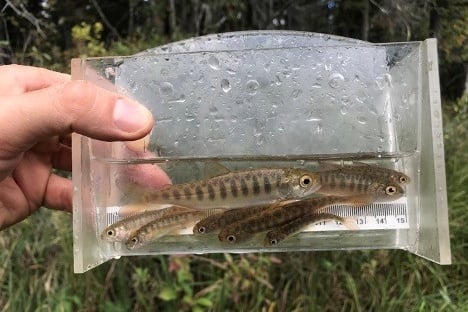Health
Historic logging contributes to water temperature increases for salmon, study finds

|
|
A collaborative study between researchers at Simon Fraser University and Fisheries and Oceans Canada (DFO) has found that high logging intensity in the Interior watersheds of British Columbia is associated with warmer stream temperatures in salmon—bearing streams, potentially contributing to increased heat stress in salmon.
Researchers examined forestry activities, watershed characteristics, and stream habitat in the watersheds of 28 tributaries of the North Thompson River to understand how forestry influences salmon habitat in streams.
They found that while stream slope explained most of the variation in physical stream habitat, the intensity of logging in a watershed accounted for higher summer stream temperatures. The relationship between logging and stream temperatures was even stronger when the researchers looked at logging within the riparian area, the stretch of trees and vegetation that buffers streambanks and shades streams from sunlight. Their findings are published in the Canadian Journal of Fisheries and Aquatic Sciences.
High stream temperatures have a negative impact on salmon. Warmer water holds less oxygen, making it more difficult for salmon to breathe and increases their metabolism, which causes them to burn energy at a faster rate. This can make it challenging for juvenile salmon to grow while also making them more vulnerable to disease. High temperatures can also result in fewer adult salmon reaching their spawning grounds and reduced spawning success in the fish that do arrive.
Water temperatures are already rising due to climate change. The study authors note that their results can help forestry and fisheries resource managers protect salmon by avoiding further logging near salmon-bearing streams. The shade trees provide over streams helps to keep water temperatures cool enough for the fish to thrive.
Managing the heat
The study found that streams where 35 per cent of the riparian (riverbank) area was harvested between 1970 and 2019 had average maximum daily summer temperatures 3.7 °C higher than streams where five per cent of the riparian area was harvested.
“This is a really big difference for fish like salmon that are adapted to cool water. At higher water temperatures fish will stop growing, struggle to get enough oxygen, and even die,” says the studies’ lead author, Dylan Cunningham, who carried out this research for his masters as a student in SFU’s School of Resource and Environmental Management (REM) in the Salmon Watershed Lab. Cunningham was also a co-op biologist for DFO, while collaborating with other DFO researchers based out of REM in the Cooperative Research Management Institute.
These streams on the high (35 per cent) end of riparian harvests saw average daily maximum summer temperatures of 17.2°C, which is high enough to cause stress to juvenile coho.
“Harvesting riparian habitats in headwater streams leads to warmer water temperatures with potential downstream consequences for fish,” says study co-author and research scientist with DFO, Doug Braun.
The study authors suggest that maintaining and or increasing forest cover, including in the currently unprotected riparian areas of headwater streams, could buffer predicted temperature increases.
Additionally, managing forestry and logging practices at a finer spatial scale could allow for more control over forestry impacts to reduce the negative impacts on salmon. The authors note that the proportion of each watershed logged ranged from one to fifty–nine percent. Cunningham notes that fifty–nine is a large and shocking amount of logging for a single watershed.





Health
April 22nd to 30th is Immunization Awareness Week – Oldies 107.7


<!–
isIE8 = true;
Date.now = Date.now || function() return +new Date; ;
Health
AHS confirms case of measles in Edmonton – CityNews Edmonton


Alberta Health Services (AHS) has confirmed a case of measles in Edmonton, and is advising the public that the individual was out in public while infectious.
Measles is an extremely contagious disease that is spread easily through the air, and can only be prevented through immunization.
AHS says individuals who were in the following locations during the specified dates and times, may have been exposed to measles.
- April 16
- Edmonton International Airport, international arrivals and baggage claim area — between 3:20 p.m. and 6 p.m.
- April 20
- Stollery Children’s Hospital Emergency Department — between 5 a.m. to 3 p.m.
- April 22
- 66th Medical Clinic (13635 66 St NW Edmonton) — between 12:15 p.m. to 3:30 p.m.
- Pharmacy 66 (13637 66 St NW Edmonton) — between 12:15 p.m. to 3:30 p.m.
- April 23
- Stollery Children’s Hospital Emergency Department — between 4:40 a.m. to 9:33 a.m.
AHS says anyone who attended those locations during those times is at risk of developing measles if they’ve not had two documented doses of measles-containing vaccine.
Those who have not had two doses, who are pregnant, under one year of age, or have a weakened immune system are at greatest risk of getting measles and should contact Health Link at 1-877-720-0707.
Symptoms
Symptoms of measles include a fever of 38.3° C or higher, cough, runny nose, and/or red eyes, a red blotchy rash that appears three to seven days after fever starts, beginning behind the ears and on the face and spreading down the body and then to the arms and legs.
If you have any of these symptoms stay home and call Health Link.
In Alberta, measles vaccine is offered, free of charge, through Alberta’s publicly funded immunization program. Children in Alberta typically receive their first dose of measles vaccine at 12 months of age, and their second dose at 18 months of age.
Health
U.S. tightens rules for dairy cows a day after bird flu virus fragments found in pasteurized milk samples – Toronto Star


/* OOVVUU Targeting */
const path = ‘/news/canada’;
const siteName = ‘thestar.com’;
let domain = ‘thestar.com’;
if (siteName === ‘thestar.com’)
domain = ‘thestar.com’;
else if (siteName === ‘niagarafallsreview.ca’)
domain = ‘niagara_falls_review’;
else if (siteName === ‘stcatharinesstandard.ca’)
domain = ‘st_catharines_standard’;
else if (siteName === ‘thepeterboroughexaminer.com’)
domain = ‘the_peterborough_examiner’;
else if (siteName === ‘therecord.com’)
domain = ‘the_record’;
else if (siteName === ‘thespec.com’)
domain = ‘the_spec’;
else if (siteName === ‘wellandtribune.ca’)
domain = ‘welland_tribune’;
else if (siteName === ‘bramptonguardian.com’)
domain = ‘brampton_guardian’;
else if (siteName === ‘caledonenterprise.com’)
domain = ‘caledon_enterprise’;
else if (siteName === ‘cambridgetimes.ca’)
domain = ‘cambridge_times’;
else if (siteName === ‘durhamregion.com’)
domain = ‘durham_region’;
else if (siteName === ‘guelphmercury.com’)
domain = ‘guelph_mercury’;
else if (siteName === ‘insidehalton.com’)
domain = ‘inside_halton’;
else if (siteName === ‘insideottawavalley.com’)
domain = ‘inside_ottawa_valley’;
else if (siteName === ‘mississauga.com’)
domain = ‘mississauga’;
else if (siteName === ‘muskokaregion.com’)
domain = ‘muskoka_region’;
else if (siteName === ‘newhamburgindependent.ca’)
domain = ‘new_hamburg_independent’;
else if (siteName === ‘niagarathisweek.com’)
domain = ‘niagara_this_week’;
else if (siteName === ‘northbaynipissing.com’)
domain = ‘north_bay_nipissing’;
else if (siteName === ‘northumberlandnews.com’)
domain = ‘northumberland_news’;
else if (siteName === ‘orangeville.com’)
domain = ‘orangeville’;
else if (siteName === ‘ourwindsor.ca’)
domain = ‘our_windsor’;
else if (siteName === ‘parrysound.com’)
domain = ‘parrysound’;
else if (siteName === ‘simcoe.com’)
domain = ‘simcoe’;
else if (siteName === ‘theifp.ca’)
domain = ‘the_ifp’;
else if (siteName === ‘waterloochronicle.ca’)
domain = ‘waterloo_chronicle’;
else if (siteName === ‘yorkregion.com’)
domain = ‘york_region’;
let sectionTag = ”;
try
if (domain === ‘thestar.com’ && path.indexOf(‘wires/’) = 0)
sectionTag = ‘/business’;
else if (path.indexOf(‘/autos’) >= 0)
sectionTag = ‘/autos’;
else if (path.indexOf(‘/entertainment’) >= 0)
sectionTag = ‘/entertainment’;
else if (path.indexOf(‘/life’) >= 0)
sectionTag = ‘/life’;
else if (path.indexOf(‘/news’) >= 0)
sectionTag = ‘/news’;
else if (path.indexOf(‘/politics’) >= 0)
sectionTag = ‘/politics’;
else if (path.indexOf(‘/sports’) >= 0)
sectionTag = ‘/sports’;
else if (path.indexOf(‘/opinion’) >= 0)
sectionTag = ‘/opinion’;
} catch (ex)
const descriptionUrl = ‘window.location.href’;
const vid = ‘mediainfo.reference_id’;
const cmsId = ‘2665777’;
let url = `https://pubads.g.doubleclick.net/gampad/ads?iu=/58580620/$domain/video/oovvuu$sectionTag&description_url=$descriptionUrl&vid=$vid&cmsid=$cmsId&tfcd=0&npa=0&sz=640×480&ad_rule=0&gdfp_req=1&output=vast&unviewed_position_start=1&env=vp&impl=s&correlator=`;
url = url.split(‘ ‘).join(”);
window.oovvuuReplacementAdServerURL = url;
Infected cows were already prohibited from being transported out of state, but that was based on the physical characteristics of the milk, which looks curdled when a cow is infected, or a cow has decreased lactation or low appetite, both symptoms of infection.
function buildUserSwitchAccountsForm()
var form = document.getElementById(‘user-local-logout-form-switch-accounts’);
if (form) return;
// build form with javascript since having a form element here breaks the payment modal.
var switchForm = document.createElement(‘form’);
switchForm.setAttribute(‘id’,’user-local-logout-form-switch-accounts’);
switchForm.setAttribute(‘method’,’post’);
switchForm.setAttribute(‘action’,’https://www.thestar.com/tncms/auth/logout/?return=https://www.thestar.com/users/login/?referer_url=https%3A%2F%2Fwww.thestar.com%2Fnews%2Fcanada%2Fu-s-tightens-rules-for-dairy-cows-a-day-after-bird-flu-virus-fragments-found%2Farticle_985b0bac-0252-11ef-abc6-eb884d6a1f0c.html’);
switchForm.setAttribute(‘style’,’display:none;’);
var refUrl = document.createElement(‘input’); //input element, text
refUrl.setAttribute(‘type’,’hidden’);
refUrl.setAttribute(‘name’,’referer_url’);
refUrl.setAttribute(‘value’,’https://www.thestar.com/news/canada/u-s-tightens-rules-for-dairy-cows-a-day-after-bird-flu-virus-fragments-found/article_985b0bac-0252-11ef-abc6-eb884d6a1f0c.html’);
var submit = document.createElement(‘input’);
submit.setAttribute(‘type’,’submit’);
submit.setAttribute(‘name’,’logout’);
submit.setAttribute(‘value’,’Logout’);
switchForm.appendChild(refUrl);
switchForm.appendChild(submit);
document.getElementsByTagName(‘body’)[0].appendChild(switchForm);
function handleUserSwitchAccounts()
window.sessionStorage.removeItem(‘bd-viafoura-oidc’); // clear viafoura JWT token
// logout user before sending them to login page via return url
document.getElementById(‘user-local-logout-form-switch-accounts’).submit();
return false;
buildUserSwitchAccountsForm();
console.log(‘=====> bRemoveLastParagraph: ‘,0);
-
Art24 hours ago
The unmissable events taking place during London’s Digital Art Week
-



 Politics19 hours ago
Politics19 hours agoOpinion: Fear the politicization of pensions, no matter the politician
-



 Politics18 hours ago
Politics18 hours agoPecker’s Trump Trial Testimony Is a Lesson in Power Politics
-



 Science18 hours ago
Science18 hours agoNASA Celebrates As 1977’s Voyager 1 Phones Home At Last
-
Media17 hours ago
B.C. puts online harms bill on hold after agreement with social media companies
-
Business17 hours ago
Oil Firms Doubtful Trans Mountain Pipeline Will Start Full Service by May 1st
-
Art20 hours ago
Turner Prize: Shortlisted artist showcases Scottish Sikh community
-
Media11 hours ago
B.C. online harms bill on hold after deal with social media firms




